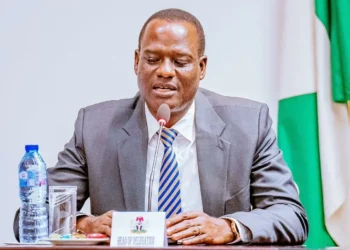- Africa’s digital payments revolution was built on local ingenuity, leveraging mobile connectivity and solving grassroots problems without waiting for global solutions.
- Pioneers like Curtis Vanderpuije, Deji Oguntonade, and Ronke Kuye laid the foundational infrastructure and trust systems that enabled mass financial inclusion and digital transformation.
- Nkebet Mesele’s Made in Payments podcast documents Africa’s evolution as a payments innovator, showcasing how the continent’s model offers a blueprint for global financial systems.
When global financial analysts look at Africa’s digital payments market—a sector projected to exceed a staggering $232 billion in transaction value by 2025 and reach $1.5 trillion by 2030—they often see a sudden boom.
They miss the decades of ingenuity, grit, and visionary groundwork that made this generational leap possible.
That historical context and foresight are precisely what Nkebet Mesele, Founder and CEO of Intreensic, is intent on capturing. Through her acclaimed podcast, Made in Payments, Mesele positions herself not just as a host but as a payments archaeologist, arguing that the story of Africa’s shift from a cash-dominant society is a profound narrative of contextual innovation and one that holds critical lessons for the rest of the world.
Building the Rails of Self-Reliance
Mesele posits that Africa’s payments model is unique because innovators did not wait for global solutions; they looked at deep-seated local problems and designed bespoke systems that leveraged the continent’s most abundant resource—mobile connectivity. The podcast serves as her proof point, providing unvarnished accounts from the people who initiated this change.
In Ghana, Curtis Vanderpuije of ExpressPay recalled the urgency of their initial solution because “you couldn’t pay for internet on the internet.” This was a foundational act of building utility where none existed, establishing the basic infrastructure for mobile wallets and interoperable platforms long before they were mainstream.
Across the border, payments veteran Deji Oguntonade exemplified the radical thinking that makes Africans different. Nearly 25 years ago, he championed a vision where a phone number became an account number, a strategic pivot that laid the groundwork for Nigeria’s entire modern digital payments architecture. As Mesele often summarizes, this homegrown, “do something different” mindset prioritized mass inclusion and allowed Africa to leapfrog the card-centric legacy systems of developed markets.
The Persistence Behind the Progress
The narrative of African payments often glosses over the institutional persistence required to establish foundational trust and infrastructure. Made in Payments ensures that the pioneers who paved the way are given their due.
The career of Ronke Kuye is a case study in this dedication. She was at the forefront of introducing bank-issued payment cards in Nigeria—a massive cultural and logistical undertaking to deploy ATMs and POS machines nationwide. Her insistence that bank account holders “should have a card” created the critical card acceptance backbone that today supports the entire digital ecosystem, proving that every leap in fintech rests on the rails built before it.
Furthermore, Nkebet dedicates energy to showcasing the critical role of diverse leadership. A special International Women’s Day edition of the podcast highlighted leaders like Kemi Okusanya (Hydrogen), Titilola Shogaolu (Interswitch Financial Inclusion Services), Celestina Appeal (Zenith Bank), and Eduofon Japhet (Habaripay). Their influence ensures that the future of finance is built on principles of access and equity, driving financial inclusion and reimagining how capital moves across the continent.
Africa as an Exporter of Innovation
As Made in Payments moves to explore the future of cross-border transactions and regional integration, the message Mesele is driving to global stakeholders is definitive: Africa’s transformation was not accidental. It was powered by five converging forces—mobile penetration, agent networks, regulatory foresight, context-driven startups, and new infrastructure—which together form a robust, transferable model.
Nkebet Mesele’s work serves as a powerful reminder: while analysts may focus on the projected $1.5 trillion valuation by 2030, the most profound value lies in the self-reliance, ingenuity, and financial inclusion that Africa engineered for itself. This legacy is what positions the continent not merely as a burgeoning market, but as an exporter of payments innovation to the world. It’s time the global financial community stopped viewing this as a ‘catching up’ story and started seeing it as a leadership blueprint.


















